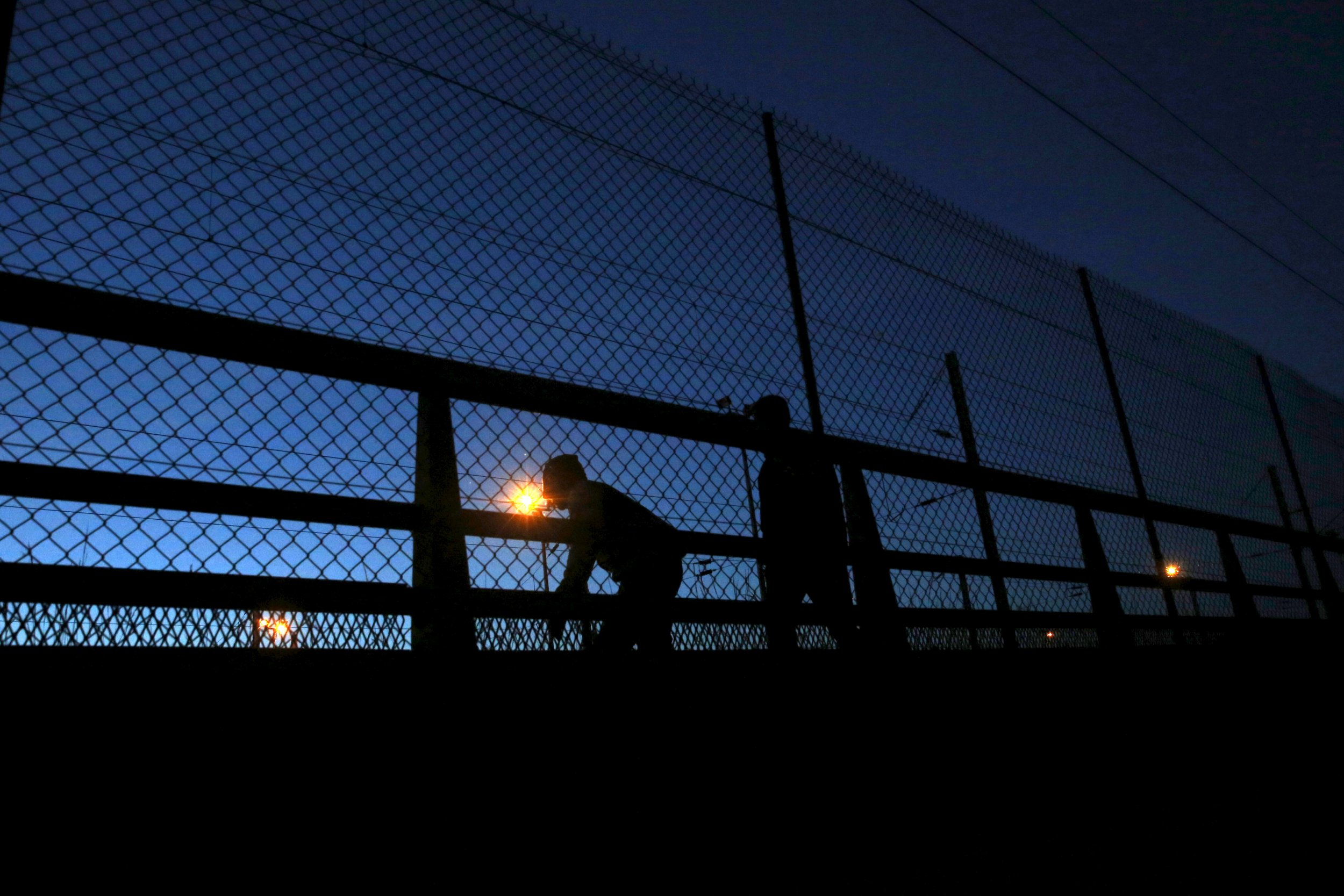
This article was originally published on The Conversation.
The ongoing attempts by migrants to scale the Eurotunnel fences near Calais are not just the result of a temporary surge of refugees arriving in Europe from war zones. They have been caused by a series of policies by successive French governments on both the left and right of the political spectrum aimed at making migrants in and around the city more and more vulnerable.
In April 2015, local authorities displaced hundreds of migrants—known in France as sans papiers—who had been living in the squats of Calais to a single site called "the New Jungle." The site is located 7 km from the city itself, on a former rubbish tip. It has neither access to water nor to power.
This displacement was a reaction to the growing violence between migrant groups in Calais before April. Tensions mounted with around 3,000 people living in shabby camps.
Moving the migrants to the "New Jungle" was yet another instance of the same reactive strategy that has characterised the management of immigrants in Calais since the late 1990s. This has followed two objectives: moving the immigrant presence away from the streets of Calais and breaking the solidarity between citizens and migrants.
Suffering since Sangatte
Groups of undocumented migrants waiting for their time to cross the Channel have been reported in Calais since 1986. Their number and origin have evolved with the geopolitical situation in Europe, Africa and the Middle East: Kosovars in the early '90s were replaced by Somalians, Afghans, Sudanese, Iranians, Iraqis and Eritreans.
After a decade of laissez-faire, Jean Pierre Chevènement, interior minister in the government of Prime Minister Lionel Jospin, inaugurated a strategy aimed at making migrants invisible, by opening the Sangatte holding centre in 1999. The centre, 9 km outside of Calais, was located in a former warehouse used during the digging of the Channel tunnel.
The number of people accommodated by the center fluctuated between 800 and 1,400. When Sangatte was closed in 2002 by the then interior minister, Nicolas Sarkozy, migrants scattered around the whole area. Informal camps were found in the vicinity of roads leading to harbor zones in Calais, as well as in Cherbourg, Grande Synthe, Norrent Fontes, Angres and Steenvoorde. As the sanitary conditions of migrant populations deteriorated, they were constantly harassed by the police.
The government did not intervene again until 2009, when Eric Buisson, interior minister in the government of Prime Minister François Fillon and the then president, Sarkozy, ordered the evacuation of what he termed "the jungle"—various settlements located in the surroundings of Calais.
The operation temporarily dismantled support networks for the migrants and moved them away from the city's surroundings. A new camp reformed in Calais, hosting several hundred people, behind a factory of the chemical company Tixoide. Other groupings found shelter on the beach and other squats in Calais. It was these groups that were evacuated again in April to the "New Jungle."
Support networks for migrants targeted
Government policies have not only targeted the migrant populations, but also their support networks. Since the 1990s, there has been a mushrooming of organisations and people providing the migrants with food, shelter, basic necessities, or simply the chance to make a phone call. L'Auberge des migrants was created in 2008 to provide daily meals and clothes and since 2009, the organisation No Borders has maintained a camp in Calais and publicized the living conditions of migrants.
In reaction to the multiplication of small and larger associations, there have been attempts to criminalize support activities. A law, created in 2004 and implemented between 2006 to 2012, stated that anybody directly helping the irregular stay of a foreigner was subject to a fine up to €30,000 and five-year imprisonment.
A series of trials received extensive media coverage in the French press. The 2009 film Welcome contributed to raising awareness against this criminalization.
Product of a European system
The two facets of the government's strategy—making immigrants invisible and delegitimizing their solidarity networks—has effectively justified a kind of de facto deportation policy. Immigrants are presented by politicians and the media as transit migrants who do not wish to stay in France and therefore have no will to integrate into the French society.
In fact, this situation is largely a consequence of a European agreement called Dublin II that obliges asylum seekers to solicit a refugee status in the country in which they first arrive. Many arrive in Italy, Malta or Greece, where the application process can take a long time, acceptances are low and living conditions are harsh—prompting them to move on to another country.
What many migrants may not know is that France gives refugee status to almost all of Eritreans or Syrians who request it. The acceptance rate for Syrians was 96 percent in 2014 and Eritreans are having their asylum claims processed very quickly in Calais.
When immigrants get information about the process, many do choose to stay in France and ask for a status of refugee. OFPRA, the agencey for refugees and asylum seekers, opened an information center in Calais in June 2014. During the second half of 2014 only, it received 437 applications with an acceptation rate of 48 percent, most of them Sudanese and Eritreans.
Immigrants don't all want to cross the Channel just because they want to go to the U.K., but they are trying to move on through an EU asylum system that is condemning them to a clandestine life of trying to avoid deportation.
Thomas Lacroix is Deputy Director of Migrinter at Université de Poitiers. This article was originally published on The Conversation. Read the original article.
Uncommon Knowledge
Newsweek is committed to challenging conventional wisdom and finding connections in the search for common ground.
Newsweek is committed to challenging conventional wisdom and finding connections in the search for common ground.
About the writer
To read how Newsweek uses AI as a newsroom tool, Click here.







